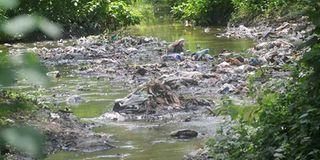Filth from River Njoro, streams still flows into Lake Nakuru

A river pours its waste into Lake Nakuru. Despite the government's intervention to clean up the lake, residents residing upstream still throw pollutants into River Njoro and other streams which drain into the lake. PHOTO | SAMUEL BAYA | NATION MEDIA GROUP
What you need to know:
- Kenya Wildlife Service, which manages the park, described the pollution of the lake as shocking.
- In July, the government through the Rapid Results Initiative conducted a clean-up of the lake.
- Nakuru County Environment CEC said the matter can best be addressed by the Nakuru Water And Sewerage Company.
Filthy rivers and streams are still depositing their waste into Lake Nakuru, heavily polluting the lake that is already reeling from continued pollution.
Lake Nakuru National Park is one of the iconic tourist attractions in the South Rift.
A spot check at the lake revealed the sorry state of affairs where River Njoro and other small streams still pour their wastes, something the Kenya Wildlife Service (KWS) which manages the park described as shocking.
When the Daily Nation visited the park recently, the flow of plastics bottles and other pollutants that have changed the waters entering the lake from the blueish colour to black revealed the extent of the pollution at the lake that is home to the famous flamingos.
FLAMINGOS
The degradation is believed to be the reason that the wonder birds left the lake in droves about two years ago, although they have slowly started to return back.
The park’s Warden in Charge Catherine Wambani told the Nation in an interview that they are still experiencing pollution at the lake despite various interventions that KWS has put in place to address the situation.
“We are still having a problem. The waters entering the lake are heavily polluted, mainly from the upstream Nakuru. We have tried to engage several actors on the same. Cleaning has been done severally but the problem still persists. We are also baffled,” she said.
In July, the government through the Rapid Results Initiative conducted a clean-up of the lake, opened up several access roads but the filthy and heavily polluted rivers continue dumping the filthy waste into the lake.
“It is a problem because we clean the Lake and whenever it rains, all the waste from the upstream [flows] into the Lake. So we keep on cleaning and the waste keeps on being discharged. It is a big problem,” she added.
INDUSTRIES
A Nakuru environment activist James Wakibia said the heavy pollution of Lake Nakuru is caused by industries and human activities in the fast-growing town and its environs.
He told the Nation that he has participated in the previous cleaning of the lake but that has not brought any relief as the problem still goes on unabated.
He said that they have cleaned Njoro River four times now but plastic bottles are still being thrown into the river which then discharges the waste into the lake which is at the heart of the national park.
CLEAN-UPS
“In a year, we do like three clean-ups and almost a week later these plastic bottles always go back to the park, which begs the questions, are clean-ups very sustainable? Are we going to preserve the environment through clean-ups or we need to employ better ways of dealing with these plastic bottle pollution?” posed Mr Wakabia.
He called on the government to launch a major intervention to save the lake from pollution.
PLASTIC PRODUCTS
At the same time, he urged industries in Nakuru to be more vigilant and ensure that their products do not contribute to environmental degradation.
“Clean-ups are just like first aid and you are not treating the problem. The problem is plastics and therefore I am asking the industries to be aware and understand how the products they are manufacturing are harmful to the environment and the possible remedies to address the same,” he said.
Nakuru County Executive for Water, Environment and Natural Resources Festus Ngeno declined to comment on the matter saying it can best be addressed by the Nakuru Water And Sewerage Company.
“I cannot comment on the lake pollution because there is another agency charged with [dealing with] the matter,” he said.




